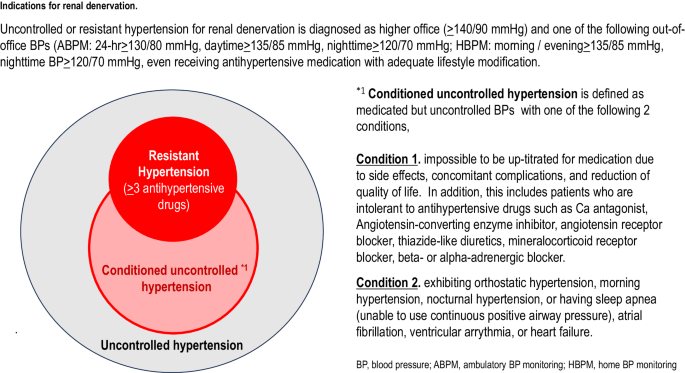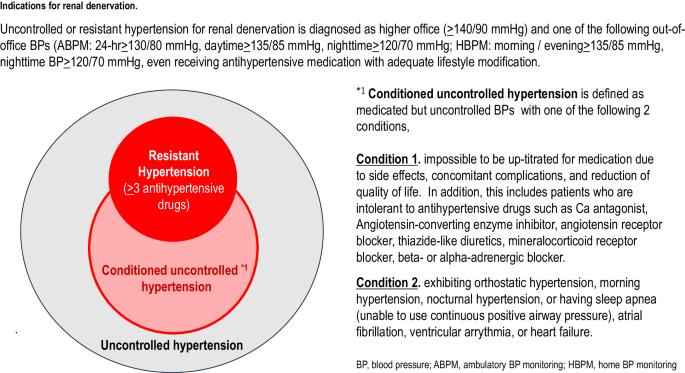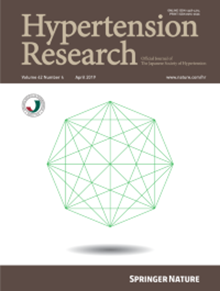Consensus statement on renal denervation by the Joint Committee of Japanese Society of Hypertension (JSH), Japanese Association of Cardiovascular Intervention and Therapeutics (CVIT), and the Japanese Circulation Society (JCS)
IF 4.3
2区 医学
Q1 PERIPHERAL VASCULAR DISEASE
引用次数: 0
Abstract
This is the first consensus statement of the Joint Committee on Renal Denervation of the Japanese Society of Hypertension (JSH)/Japanese Association of Cardiovascular Intervention and Therapeutics (CVIT)/Japanese Circulation Society (JCS). The consensus is that the indication for renal denervation (RDN) is resistant hypertension or “conditioned” uncontrolled hypertension, with high office and out-of-office blood pressure (BP) readings despite appropriate lifestyle modification and antihypertensive drug therapy. “Conditioned” uncontrolled hypertension is defined as having one of the following: (1) inability to up-titrate antihypertensive medication due to side effects, the presence of complications, or reduced quality of life. This includes patients who are intolerant of antihypertensive drugs; or (2) comorbidity at high cardiovascular risk due to increased sympathetic nerve activity, such as orthostatic hypertension, morning hypertension, nocturnal hypertension, or sleep apnea (unable to use continuous positive airway pressure), atrial fibrillation, ventricular arrythmia, or heart failure. RDN should be performed by the multidisciplinary Hypertension Renal Denervation Treatment (HRT) team, led by specialists in hypertension, cardiovascular intervention and cardiology, in specialized centers validated by JSH, CVIT, and JCS. The HRT team reviews lifestyle modifications and medication, and the patient profile, then determines the presence of an indication of RDN based on shared decision making with each patient. Once approval for real-world clinical use in Japan, however, the joint RDN committee will update the indication and treatment implementation guidance as appropriate (annually if necessary) based on future real-world evidence.


日本高血压学会 (JSH)、日本心血管介入与治疗协会 (CVIT) 和日本循环学会 (JCS) 联合委员会关于肾脏去神经支配的共识声明。
这是日本高血压学会(JSH)/日本心血管介入与治疗协会(CVIT)/日本循环学会(JCS)肾脏去神经联合委员会的第一份共识声明。共识是,肾脏去神经支配 (RDN) 的适应症是抵抗性高血压或 "条件性 "未控制高血压,即尽管采取了适当的生活方式调整和降压药物治疗,但诊室和诊室外血压 (BP) 读数仍然很高。"条件性 "未控制高血压的定义是具有以下情况之一:(1) 因副作用、并发症或生活质量下降而无法增加降压药物剂量。这包括对降压药物不耐受的患者;或 (2) 因交感神经活动增加而合并心血管高风险疾病,如直立性高血压、晨起高血压、夜间高血压或睡眠呼吸暂停(无法使用持续气道正压)、心房颤动、室性心律失常或心力衰竭。高血压肾脏去神经支配治疗(RDN)应由多学科高血压肾脏去神经支配治疗(HRT)团队实施,该团队由高血压、心血管介入和心脏病学专家领导,在经 JSH、CVIT 和 JCS 验证的专业中心进行。HRT 团队对生活方式调整、药物治疗和患者资料进行审查,然后在与每位患者共同决策的基础上确定是否存在 RDN 适应症。不过,一旦批准在日本实际临床使用,RDN 联合委员会将根据未来的实际证据,酌情更新适应症和治疗实施指南(必要时每年更新一次)。
本文章由计算机程序翻译,如有差异,请以英文原文为准。
求助全文
约1分钟内获得全文
求助全文
来源期刊

Hypertension Research
医学-外周血管病
CiteScore
7.40
自引率
16.70%
发文量
249
审稿时长
3-8 weeks
期刊介绍:
Hypertension Research is the official publication of the Japanese Society of Hypertension. The journal publishes papers reporting original clinical and experimental research that contribute to the advancement of knowledge in the field of hypertension and related cardiovascular diseases. The journal publishes Review Articles, Articles, Correspondence and Comments.
 求助内容:
求助内容: 应助结果提醒方式:
应助结果提醒方式:


